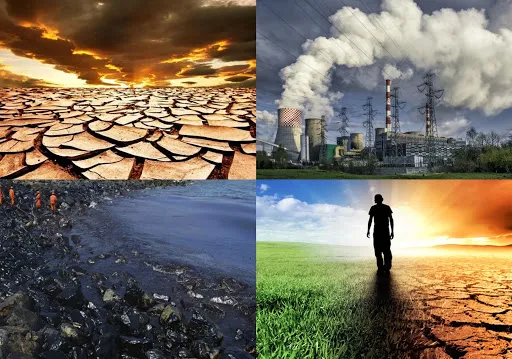Environmental pollution is the contamination of air, water, soil, and other natural resources by harmful substances, leading to a disruption of natural systems and posing risks to human health and ecosystems. It arises from a variety of sources, including industrial activities, agricultural practices, and improper waste disposal, impacting the environment in numerous ways.
Causes of Environmental Pollution:
Industrialization:
Rapid industrial growth and the concentration of industries in urban areas release pollutants into the air, water, and soil.
Urbanization:
Increased urbanization leads to deforestation, habitat loss, and higher waste generation, exacerbating pollution.
Agricultural practices:
Excessive use of pesticides and fertilizers, as well as improper waste management in agriculture, contributes to soil and water contamination.
Deforestation:
The clearing of forests for agriculture, urbanization, or mining reduces the Earth's capacity to absorb carbon dioxide and contributes to climate change, a major component of environmental pollution.
Fossil fuel dependence:
Reliance on fossil fuels for energy generation and transportation releases greenhouse gases and other pollutants into the atmosphere, contributing to climate change and air pollution.
Consequences of Environmental Pollution:
Air pollution:
Improves the health of humans and animals, as well as contributing to climate change.
Water pollution:
Contaminates drinking water sources, harming human and animal health, and disrupting aquatic ecosystems.
Soil pollution:
Reduces soil fertility, contaminates crops, and poses health risks to humans and animals.
Climate change:
Leads to rising global temperatures, extreme weather events, and sea-level rise, impacting ecosystems and human populations.
Loss of biodiversity:
Pollution and habitat destruction lead to the decline and extinction of plant and animal species.
Mitigation and Solutions:
Sustainable industrial practices:
Implementing cleaner technologies and reducing waste generation in industries.
Sustainable agriculture:
Promoting organic farming, reducing pesticide use, and implementing proper waste management practices.
Renewable energy sources:
Transitioning to solar, wind, and other renewable energy sources to reduce reliance on fossil fuels.
Waste management:
Implementing effective waste recycling programs and reducing landfill usage.
Public awareness and education:
Raising awareness about environmental pollution and its consequences to promote sustainable behavior.
Addressing environmental pollution requires a multifaceted approach involving government regulations, technological advancements, and individual actions to protect our planet and its resources for future generations.

